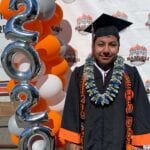
Adapting to a New Environment
By Hugo, Samueli Academy Alumnus Class of 2020
Before the Pandemic, keeping up with my college classes seemed easy. All I had to do was get to class on time, pay attention, and remember to do my homework. Once virtual classes came into the equation, things started to get a little more difficult. Now, I found myself surrounded by distractions; make one mistake and it could cause me to potentially fall behind.
Paying attention in classes became even more difficult with the many distractions. You now have to take your classes from your room, surrounded by all of your personal belongings. It seems easy enough to turn on your PS4 while in class since no one will have any idea what you are doing behind your screen. With classes conducted in a shorter time than a usual in-person class, it has become much more important for students to pay attention during the lectures, or they will easily fall behind. But shorter classes do not mean less course material. It is now the student’s responsibility to not only review but also learn new material outside the class. During my experience, most of the learning occurred outside of the classes. Since time was limited during lectures, the professor could only cover a small portion of the week’s chapters. This required me to find some spare time to go back and learn the material the professor did not have time to cover since we would be learning a different chapter the next week. This was extra work on top of studying. While still manageable, if I were to not prioritize stuff properly, I would find myself falling behind quickly.
When I first imagined what my first semester at college would be like, I never thought that I would be taking all my classes online. I just decided to make the best of the situation. My first few weeks at California State University, Fullerton were a complete mess. I somehow managed to keep up, despite my disorganization. At that point I was not necessarily falling behind; instead, I found myself cramming all my work into the weekend. In some instances, I worked on assignments the day before it was due. After the first two weeks of school, I decided to make a weekly schedule that allowed me to organize my class and study time; I even discover some free time too. For other students out there, I would suggest finding a hobby to fill the free time since being at home most of the day can get pretty boring. Personally, I got involved with 3D printing and Rubik’s Cube solving.
Since I knew virtual learning was not going to go away, I started to use the advantages that came with it. There have been more opportunities to get help when needed since all professors have office hours, where you are able to ask for help, and some classes even offer to tutor. Before, both of these resources would have intimidated me since I would have to go to the professor’s office asking for help. Now, guidance was just a few clicks away. Throughout the semester, I constantly found myself seeking help in math, and my professor, Professor Pham, was always happy to help out with any question I had. It was also nice to finally be able to talk to someone instead of just staring into a Zoom room full of cameras, mostly turned off.
Overall, my first semester experience got better as the semester ended. I started getting into a habit of turning in assignments a few days prior to the due date and studying became a daily thing. By the time finals came around, I was so prepared that I only needed very little time to study. It might not have been the proper college experience I had originally imagined but, in the end, I made the best of the situation.
Hugo is currently pursuing Civil Engineering at California State University, Fullerton.
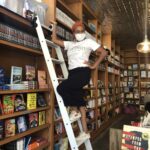
Meet Onikah
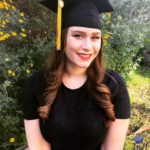
Meet Jacquelyn
During this time of the coronavirus, it’s a parent’s worst nightmare. Your adult child is studying abroad and on a daily basis the U.S. and other countries are restricting travel and movement. Your child contacts you. She thought she could ride out the coronavirus in place but now she’s scared. The country has announced that it will be instituting a state of emergency and potential martial law soon. Food is getting scarce. Her university isn’t providing much guidance.
That was the situation with Jacquelyn Leyva, an Orangewood Foundation scholarship recipient in our Advanced Studies Program.
Jacquelyn first began receiving support from Orangewood Foundation when she was a senior in high school and wanted to enroll at Orange Coast College (OCC). She received an Orangewood scholarship and, to make ends meet, would occasionally visit the Orangewood Resource Center for the free toiletries. “Coming out of foster care or a tough situation, everything seems more difficult,” she says. “Applying to college and financial aid, it’s so overwhelming. Orangewood Foundation helped me every step of the way.”
With the help of Orangewood scholarships, Jacquelyn graduated from OCC and then from UC Berkeley. She received an Advanced Studies scholarship and was in Thailand as part of her first year of a Master in Global Studies program at Humboldt University of Berlin. She had started the academic year at the university’s campus in Berlin, Germany, April of 2019. With her focus is on fair trade fashion, she spent the second semester in Buenos Aires, Argentina, and then Bangkok, Thailand.
Jacquelyn secured a small one-room apartment and, in early January, began her classes in Bangkok. With only a mini-refrigerator and electric tea kettle, she relied on nearby inexpensive restaurants for her meals. In February, while the country had the second highest number of COVID-19 cases (behind China), the actual number was still small and classes and field trips continued as usual. Carla Etzold, Orangewood’s Scholarships & Grants Coordinator, reached out to Jacquelyn via email and Jacquelyn replied that she was fine. Things in Thailand weren’t that bad and she would just wait it out.
However, in early March the local restaurants switched to take-out only, then closed altogether a few days later. Jacquelyn began to wonder if they knew something she didn’t. “It was very tumultuous and I was getting nervous,” she says. The political climate in the country was intensifying and the government was putting limits on free speech, especially about COVID-19.
Jacquelyn reached out to Carla for reassurance. “Carla was the first person I contacted, thinking she might give me reassurance. I was really scared but thought maybe I was thinking irrationally. But I really want to leave immediately.” When Carla saw Jacquelyn’s email, she researched the situation in the country and learned that Jacquelyn’s fears were well-founded.
Carla asked and received approval to use Advanced Studies scholarship funds to get Jacquelyn home to the U.S. “It was the best feeling to know that I could ask and I knew the answer would be ‘yes,’” Carla says. “I could make it happen for Jacquelyn.” Carla searched flights which took a while since they were being cancelled or the prices were increasing as she looked. “I was trying to figure everything out,” Carla says. “I just wanted her to get home safely. It was stressful.” For her part, Jacquelyn says, “I was too anxious to even sleep.”
Finally, within 24 hours of Jacquelyn first reaching out to her, Carla was able to secure a 10:00 P.M. flight, just in the nick of time. The following day the Bangkok airport was going to close. Over the course of 24 long hours, Jacquelyn flew from Bangkok to Japan to San Francisco. Carla kept her cell phone on 24/7 and was checking the airline website to track the progress of Jacquelyn’s flights. In the crowded airports and on the planes, Jacquelyn saw many passengers in face masks and some even wearing head-to-toe hazmat suits.
Every time her flight landed, Jacquelyn called Carla to let her know. During her 14 hour layover in Japan, Carla encouraged Jacquelyn to call her grandma with whom Jacquelyn had been placed while in foster care. “My grandma was in tears and so worried about me,” Jacquelyn says.
On March 26th, Jacquelyn’s plane landed in San Francisco. Since then, she’s been staying with her boyfriend and his parents in Northern California. “I wasn’t able to really sleep until I got to my boyfriend’s house and laid down,” she says. “I was so happy. It was such a relief. All that stress lifted from my body.” Jacquelyn is healthy and continuing with school, submitting her final exams and papers. The summer internship she secured at the World Fair Trade Organization Asia is uncertain. She hopes to stay on track and graduate in April of 2021.
After receiving her master’s degree, Jacquelyn’s goal is to secure a position with the World Fair Trade Organization, auditing and providing guidance to the fair trade industry. Her ultimate dream job is Director of Social & Environmental Responsibility for a fashion brand. Despite her ordeal getting home during a global pandemic, Jacquelyn’s spirit of adventure and her desire to travel haven’t diminished. “Every experience makes me stronger,” she says.
“Orangewood really does support its scholarship students,” Jacquelyn says. “Carla has always gone above and beyond. If I needed anything, she was there to help…which is why I turned to her in this situation.” She continues, “Had Carla not been able to help, I probably would have stayed in Thailand. I had no other alternatives. She was a lifesaver, literally. I’m really grateful to Orangewood Foundation.”
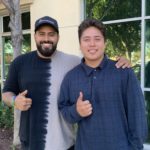
Meet Ivan
“I always thought that I was a bad kid; that I didn’t deserve anything, didn’t deserve to be happy,” says Ivan.
His dad was a drug addict and mom was an alcoholic. His parents worked a lot, leaving Ivan and his siblings home alone without supervision. Ivan was placed in foster care at 13 years old. “Being in foster care and in group homes, you don’t know what’s next,” Ivan says. “You don’t expect anything. You just live and survive.”
When Ivan was a teenager in foster care, he started attending Orangewood’s Independent Living Program (ILP) workshops learning life skills. But what he remembers most about it was the Orangewood staff and Peer Mentors. “People treated me with respect and that motivated me,” he says.
In the last year, Ivan’s Youth Support Specialist, Frank, noticed a changed in him. “He wanted to change his life,” Frank says. “He demonstrated that he was serious and he started to set boundaries with his peers who may not have been a positive influence.” Ivan explains, “It’s hard because my friends are my family. But I have to set myself apart and decide I want something more in life.” He visited our onsite Orangewood Resource Center every day to wash his clothes, enjoy a hot meal, print out his resume and find resources.
Frank says, “At one point, Ivan was overwhelmed because he had nothing, but I told him to be patient. Then he got a job offer, was approved to become a Peer Mentor, and got accepted into our Rising Tide transitional housing program.”
Today Ivan has a full-time job at Motive Energy where there is room for growth. He wakes up every day at 3:00 A.M. to be at his job in Corona by 4:00 and gets off at 1:00 P.M. Ivan then heads straight to Orangewood for support and help facilitate the ILP workshops as a Peer Mentor. “I want to give back,” Ivan says. “I know what it’s like to feel that nobody understands them and that they’re alone. I tell them, ‘I was in your shoes. Every day I’m trying to be better and you can too.’”
When describing his life currently, Ivan frequently uses the word “blessed” and says, “Sometimes I wonder what I would do without Orangewood Foundation. This is like my family. Orangewood has given me things I never thought I could have – living a normal, decent human life where I don’t have to just survive.”
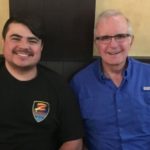
Meet Ace & Elias
Growth. That’s what it means to be an Orangewood mentor, according to Walter “Ace” Hoyt. Ace was paired with Elias, a former foster youth, in the summer of 2012. When Elias, age 19 at the time, asked for a mentor, he had one criterion: he didn’t want an “old guy.” “I wasn’t the young match he was looking for,” laughs 72-year old Ace thinking back on the first time they met.
Ace had recently retired and was looking for something to do. His friend suggested to get involved in the community and suggested Orangewood Foundation as a place to start. “It was perfect. I wanted to give younger people advice and share my life experience,” he says. Ace met Elias and, despite being the “old guy,” they hit it off.
Ace admits being a mentor isn’t always easy. “I’m a traditionalist,” he says. “I thought a goal for someone at Elias’ age should be getting a college degree.” So when Elias expressed his desire to quit college, Ace was taken aback. “We had a heart-to-heart talk and I gave him my opinion on it. But in the end, it was about Elias’ goals, not mine,” says Ace. “I’m here to support him in whatever he wants to do.”
Ace learned Elias had a passion for karate and he ultimately wanted to run his own karate dojo (studio). They worked together and created steps for how Elias could reach his new goal. “I helped him identify the skills he needed to run a dojo,” says Ace. “You need marketing and sales skills to get people in the door, you need management skills to manage and the list goes on.” Elias took online classes, went to workshops and found a mentor in the karate industry with the help of Ace.
Today, Elias is working at a karate dojo and thriving in his environment. “He is a resilient and hardworking young man,” says Ace. “It’s amazing to see how much he grew.” Elias is busy with work, but the pair always finds time to have a meal together.
As for the “old guy,” Ace learned a thing or two. “I learned about patience,” he says. “Taking on a mentee requires a lot of patience. A lasting relationship requires work and time.” Inspired by the youth organizations Ace volunteers at including Orangewood Foundation, he has taken courses in mediation and hopes to become a mediator in family court.
Ace reflects on the past seven years of mentorship, “I’ve grown, because of youth like Elias. I have a passion to work with youth. I’m not just sitting around and thinking about who I’m going to play golf with today.”
If you’re interested in becoming a mentor like Ace, contact our Coordinator of Mentoring Services, Shane Panther, at spanther@orangewoodfoundation.org.